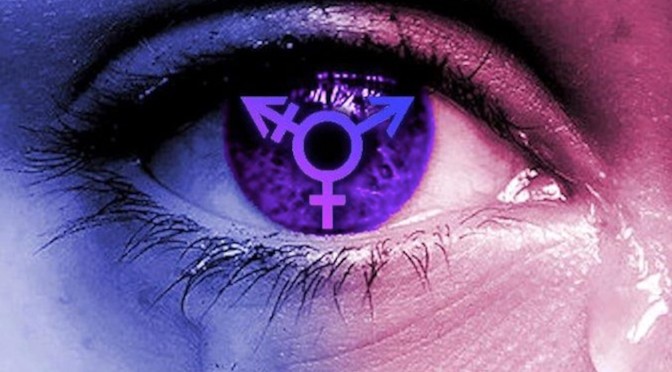Dysphoria is such an ugly word. It sounds like something that you catch from an uncovered sneeze or a dirty toilet seat. You don’t need to have a solid grasp on the definition to sense viscerally that you don’t want it. Nothing good is about to happen when a word starts with D-Y-S-P-H.1 Dysphoria opposes and negates of all those words we associate with peace and wellbeing. It is dissatisfaction, discomfort, disorientation, and perhaps even dis-ease.
People may be dysphoric for all sorts of reasons, or for no apparent reason at all. Gender dysphoria is specifically the discontentment or anguish felt by the transgender individuals arising from tension between their biological sex and their gender identity.
Not all transgender people experience significant gender dysphoria. Corporal Klinger didn’t. Your average tomboy probably doesn’t. The occasional crossdresser who tarts up for thrills or stress relief might or might not. In other words, regardless of how people see themselves or express themselves, they are not gender dysphoric unless they suffer distress over it.
In an earlier post, I compared my own gender dysphoria to the hiss of an old time radio. I can still hear the music (life), but the underlying static is always with me, sometimes nearly drowning out the music itself. Indeed, the delay to publication in this post owes largely to the fact that the noise has been all but deafening lately.
The emerging cultural narrative about transgender people doesn’t totally ignore gender dysphoria, but it does tend to cast it as a temporary nuisance rather than the lingering existential crisis with which I am more familiar. The trans person, so the story goes, isn’t really conflicted at all. They were merely born in the wrong body.2 They always knew who they were, and suffered only because society didn’t see it too. Once everyone was on the same page, the situation was quickly set aright. Hormones. Surgery. Happily ever after.
Transitions like this certainly happen, and I think they are cause for raucous celebration. A life liberated from the ponderousness of gender dysphoria is a very, very beautiful thing. Unfortunately, my own limited experience with the transgender community leads me to question how often this is the case.
I recently started watching Transparent. I don’t know if I will get through it. At first I thought it was the obvious comparison–watching aging, frumpy protagonist Maura Pfefferman stumbling awkwardly through transition hits me fairly close to home. The more I’ve watched, however, the more it seems that Maura is the one stable character in a cast of crazies. She is long-suffering, self-sacrificing, patient and wise. She is transgender Jesus–healing the sick all around her.
Well, I’m not Jesus. I have moods and I make messes. I give my best to those I love, but I often screw up and have to rebuild. I see myself not as a beacon of stability, but rather as the fortunate recipient of love and support from people better attuned to the rhythms of life than I am. I haven’t always known who I am and I don’t know where I am going. I don’t know if or how I will ever get beyond gender dysphoria. One day I think that I need to make further efforts toward establishing my feminine identity, and the next I wonder if whether I might be happier back in the closet. I wake up anxious and restless in the wee hours. I crave distraction–anything to dial down the soundtrack of doubt in my head and lessen the increasingly familiar tightness in my chest.
And, I write. Though I certainly hope you enjoy and benefit from this latest creative endeavor, I am fully aware it is my own lifeboat that I inflate. Five short years ago, I wrote Gawker Slowdown.
I’m not trying to make a statement
I don’t want to draw a crowd
But being true to who I am is not a sin
I just want to feel at home inside my skin
That is still the promised land toward which I journey. One day, I hope to see its beauty with my own eyes and taste its fruit with my own mouth. For now, I still wander in the wilderness.
1 There are two other words that start with the same five letters. Neither of them are any good either.
2 We sometimes forget this is a metaphor. I take its meaning as: a) the person experiences disconnection between mind (gender) and body (sex); and b) doing nothing to fix that would be too painful to bear. For me, the concept of being born in the wrong body seems less an answer than it is a clichéd restatement of the problem of dysphoria.

Pingback: Transgender University: Treating Transsexuality - Gawker Slowdown